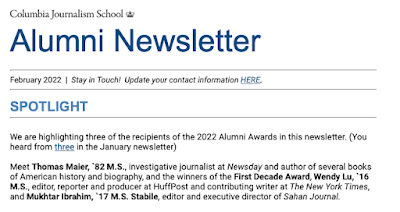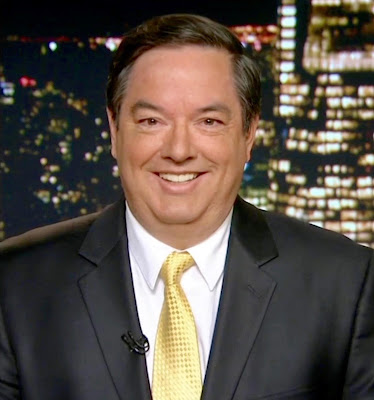Columbia Journalism School Alumni Newsletter -- Interview with 2022 Alumni Award Winner Thomas Maier
Alumni Newsletter February 2022 SPOTLIGHT
We are highlighting three of the recipients of the 2022 Alumni Awards in this
newsletter. (You heard from three in the January newsletter) Meet
Thomas Maier, `82 M.S., investigative journalist at Newsday and author of
several books of American history and biography, and the winners of the First Decade Award, Wendy Lu, `16 M.S., editor, reporter
and producer at HuffPost and contributing writer at The New York Times, and
Mukhtar Ibrahim, `17 M.S. Stabile, editor and executive director of Sahan
Journal
Thomas Maier `82
1: What is your favorite memory of the J-School?
It was thrilling on the first day to walk through the J-School’s entrance, full
of hope and ambitions, and then ascend the stairs to a place aptly called “The
World Room.” I am the first in my family to go to college, so entering Columbia,
the world’s most renowned journalism school, felt like an unforgettable dream
come true. But my most memorable time was in filming a documentary about
organized crime at the old Fulton Fish Market. It was both fun and a bit
dangerous. Our motley crew Columbia would meet at dawn, drive my old 1975 Chevy
to the cobblestoned streets around the market and then ask the fishmongers about
the wise guys who controlled their corrupt market. The sights, the smells, the
drama! At graduation, I won the John M. Patterson Award for that documentary,
which we sold to Joan Konner, then at Channel 13 and later dean of the J-School.
I came to Columbia as a print reporter from a small paper in Nyack, NY, without
any television experience, and I wound up learning a whole new set of skills
that influenced my career for the next 40 years.
2. Which story or project are you most proud of and why?
While I’m very proud of my Newsday investigative reporting, the biggest
challenge has been to write six books about America and our times. This includes
biographies of Dr. Benjamin Spock, the pediatrician and popularizer of Freud
through his famous baby book; the Newhouse family’s Conde Nast media empire and
the impact of the celebrity culture on our politics, notably the rise of Donald
Trump; and a biography of sex researchers Masters and Johnson, adapted into an
Emmy-winning Showtime television series. But I’m most proud of my trilogy of
books about the Kennedy era. The first book, in 2003, explored how the Kennedy
family’s Irish Catholic immigrant background impacted their public and private
lives. The second in 2014, When Lions Roar, explored the little-known
relationship of the Kennedys and Churchills, and was excerpted in Time.com and
featured at a JFK Library seminar. And the third, a 2019 book called Mafia Spies
, looked at the CIA during the Kennedy administration and its undeclared war run
out of Florida against Castro’s Cuba, which included the use of organized crime
figures. I traveled to Ireland, England and Cuba with these Kennedy books.
Overall, I think these books redefine our understanding of the Kennedy story –
not as a “Camelot” fantasy but rather as very influenced by their minority
background, as JFK defined in his little-known book A Nation of Immigrants. That
book led to the passage of the1965 Immigration Act, which greatly changed the
America we live in today and is the Kennedy family’s greatest legacy. 3. What advice would you give to the next generation of J-Schoolers?
Two words: character and fluency. First, be able to translate your work into as
many diverse platforms as possible – a multimedia “fluency” if you will – which
is essential to the future. Today, I think being able to edit video and know the
grammar of visual storytelling is as important as being able to type on a
computer (or a manual typewriter!) was back in the 20th century. However, the
importance of character transcends skills. It is crucial to intellectual honesty
and a fearless presentation of facts. As an investigative reporter, you learn
quickly how important character is to truth-telling – exploring the world as you
find it without preconceived bias or ideology – and how things can go terribly
wrong without it. Character teaches you to stand up to personal threats or legal
challenges, to champion the rights of those less fortunate without power or
money, and to force your news organization to publish when the cowardice of
editors and publishers prefers that your story go away. Character isn’t
something you’ll see in your paycheck but rather in the mirror. Character is
essential to good journalism and a world in desperate need of it. Being a
journalist – a witness to the world – is arguably the most noble calling of all.


